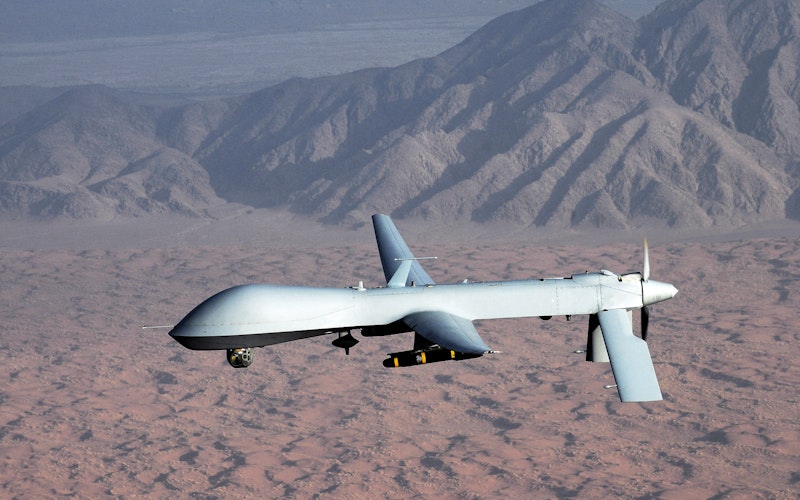
Culture At Large
The ethics of unmanned drones
Straight from the battle scenes of "Star Wars" and "Transformers," today’s military increasingly turns to remotely piloted robot planes, or “drones,” to attack enemy targets far from the front lines of the battlefield. Should this worry us?
Christian philosophers throughout history have wrestled with the apparent dichotomy between the “turn the other cheek” command of Christ and the injunction to the Israelites to slay every living creature in Canaan. The church has generally found agreement in the principles of Just War doctrine, as has the United States military.
Just War is typically broken into two parts. Jus ad bellum relates to whether one may lawfully go to war. The primary principles require that the cause be just, that the authority for the use of lethal force be legitimate, that there is a reasonable probability of success and that war is the last resort.
Drones are a tactic, a method of prosecuting warfare. Thus, assuming that the war is just, the soldier-Christian (and the citizen who oversees him) must examine his tactics in light of jus in bello, thoseprecepts which govern the conduct of troops in the prosecution of just warfare.
Just War doctrine requires three tests: Is it a military necessity? Is it discriminate or distinct, targeting lawful combatants and avoiding noncombatants? Is it proportional? Is the harm caused to civilians and civilian property disproportionately excessive relative to the military advantage?
In a drone strike, intelligence identifies an enemy operative, a missile-laden drone is launched in the region and an operator in the United States guides the aircraft, identifies the target and launches the missile, all by remote control.
Assuming that intelligence has accurately identified the targeted individual, the drone strike is lawful. By his actions the terrorist has given up his right to noncombatant protection and assumed responsibility for the violence he practices. For jus in bello, using drones is no different than any other form of military force, except that the people who pull the trigger are a world away and out of any physical danger themselves.
But is there something new about drones that should give further pause?
We cannot support the use of drones simply because they make our own troops safer. As a soldier, I am unequivocally a combatant. If my method of fighting makes me safer but unnecessarily increases the risk to noncombatants, I must reject it. Even the enemies of the United States are made in the image of our Creator, and nothing either of us does negates that reality.
Indeed, the fact that drones make our troops safer forms the strongest case against their use. Since the invention of gunpowder, moralists have feared that as technology makes it safer to kill, it lowers the decision threshold to employ lethal force.
This is no insignificant challenge. Like so many of our modern advances, drone technology has a place in just warfare only if it is restrained by both military leaders and an engaged citizenry. The nation calls on service members to do a terrible thing: to go into harm’s way, to kill our enemies to keep our friends secure and sometimes to die or be maimed.
Drones, then, put us on a precarious road between two moral crimes: If I order my soldiers into battle, but needlessly withhold the means to reduce their risk, I murder those from whom I demand trust and loyalty. But if in my zeal for good I choose to employ lethal force because I am confident that, come what may, my own soldiers will be safe, then I am equally a butcher, now of the faceless “others” whose lives I have wrongly judged as less valuable than “our own.”
Jus ad bellum, then, the ethic of going to war in the first place, returns. Because drones make war seem less painful, it is incumbent on a moral citizenry to hold leaders accountable for the dreadful terror of unleashing modern warfare. If the cause is just, woe to us for shrinking from the fight; if it is not, or if war is other than the last resort, woe to those who idle in technologically enhanced comfort while the image of Almighty God is wantonly destroyed.
The devout General Robert E. Lee said, “It is well war is so terrible, else we should grow too fond of it.” What if we cease to think it terrible, safe in stateside remote control stations?
Topics: Culture At Large, Science & Technology, Technology, News & Politics, Justice, North America